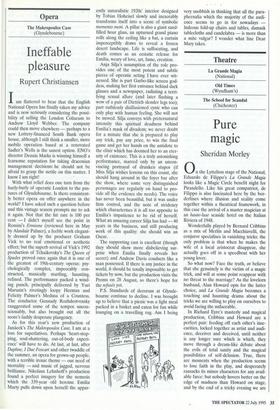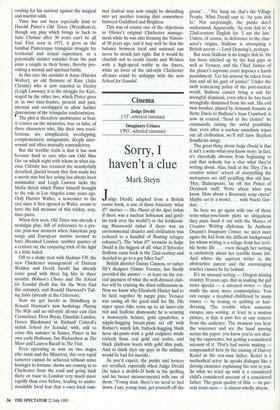Theatre
La Grande Magia (National) Old Times (Wyndham's) The School for Scandal (Chichester)
Pure magic
Sheridan Morley
n the Lyttelton stage of the National, Eduardo de Filippo's La Grande Magia looks like a Magic Circle benefit night for Pirandello. Like his great compatriot, de Filippo is also fascinated here by the bor- derlines where illusion and reality come together within a theatrical framework, in this case the arrival of a master magician at an haute-luxe seaside hotel on the Italian Riviera of 1948.
Wonderfully played by Bernard Cribbins as a mix of Merlin and Macchiavelli, the conjuror specialises in vanishing tricks: the only problem is that when he makes the wife of a local aristocrat disappear, she actually goes off in a speedboat with her young lover.
So what now? Face the truth, or believe that she genuinely is the victim of a magic trick, and will at some point reappear with no threat to the marriage? As the lovelorn husband, Alan Howard opts for the latter choice, and La Grande Magia becomes a touching and haunting drama about the tricks we are willing to play on ourselves to avoid facing the unfaceable.
In Richard Eyre's masterly and magical production, Cribbins and Howard are a perfect pair: feeding off each other's inse- curities, locked together as artist and audi- ence, deceiver and deceived, until neither is any longer sure which is which, they move through a dream-like debate about the evils of total sanity and the magical possibilities of self-delusion. True, there are moments when the production seems to lose faith in the play, and desperately ransacks its minor characters for any avail- able farce: but nobody hovers better on the edge of madness than Howard on stage, and by the end of a tricky evening we are rooting for his survival against the magical and marital odds.
Time has not been especially kind to Harold Pinter's Old Times (Wyndham's), though any play which brings us back to Julie Christie after 30 years can't be all bad. First seen in 1971, it gives us the familiar Pinteresque triangular struggle for territorial and sexual supremacy, as a potentially sinister outsider from the past joins a couple in their home, thereby pro- voking a mental and spiritual battle.
In this case the outsider is Anna (Harriet Walter), an old flatmate of Kate (Julie Christie) who is now married to Deeley (Leigh Lawson); it is the struggle for Kate, waged by the other two, which Pinter gives us in two time-frames, present and past, intercut and overlapped to allow further ilimensions of the triangular confrontation. The plot is therefore unobtrusive at best: it centres on the memories, true or false, of three characters who, like their own recol- lections, are complicated, overlapping, complementary, antagonistic, deeply inter- wound and often mutually contradictory.
But the terrible truth is that it has now become hard to care who saw Odd Man Out on which night with whom in what cin- ema. Christie has retained the wonderfully detached, glacial beauty that first made her a movie star but her acting has always been minimalist, and Leigh Lawson lacks the Mafia threat which Pinter himself brought to the role in Los Angeles some years ago. Only Harriet Walter, a newcomer to the cast since it first opened in Wales, seems to have the full measure of this tricksy, sexy, time-piece.
When first seen, Old Times was already a nostalgia play, full of references to a pre- cise post-war moment when American pop songs and European movies seemed to have liberated London: another quarter of a century on, the conjuring trick of the light is a little faded.
Off to a shaky start with Hadrian VII, the new Chichester management of Duncan Weldon and Derek Jacobi has already come good with three big hits in three months: Hobson's Choice and The School for Scandal (both due for the West End this autumn), and Ronald Harwood's Tak- ing Sides (already at the Criterion).
Now we get Jacobi as Strindberg in Ronald Hayman's new backstage Playing The Wife and an old-style all-star cast (Ian Carmichael, Dora Bryan, Dinsdale Landen, Honor Blackman) in Richard Cottrell's stylish School for Scandal, with, still to come this summer in Sussex, Pinter in his own early Hothouse, Ian Richardson as The Miser and Lauren Baca11 in The Visit.
Even operating as now on two stages (the main and the Minerva), this very rapid turnover cannot be achieved without some hostages to fortune: shows are coming in to Chichester from the road and going back there en route to London very much more rapidly than ever before, leading to under- standable local fear that a once-local sum- mer festival may now simply be dwindling into yet another touring date somewhere between Guildford and Brighton.
This was of course one of the objections to Olivier's original Chichester manage- ment while he was also forming the Nation- al 30 years ago, and it may well be that the balance between local and national can never be struck just right. But it would be churlish not to credit Jacobi and Weldon with a high-speed traffic in the foyers, while no lover of the old-style Chichester all-stars could be unhappy with the new School for Scandal.



















































 Previous page
Previous page